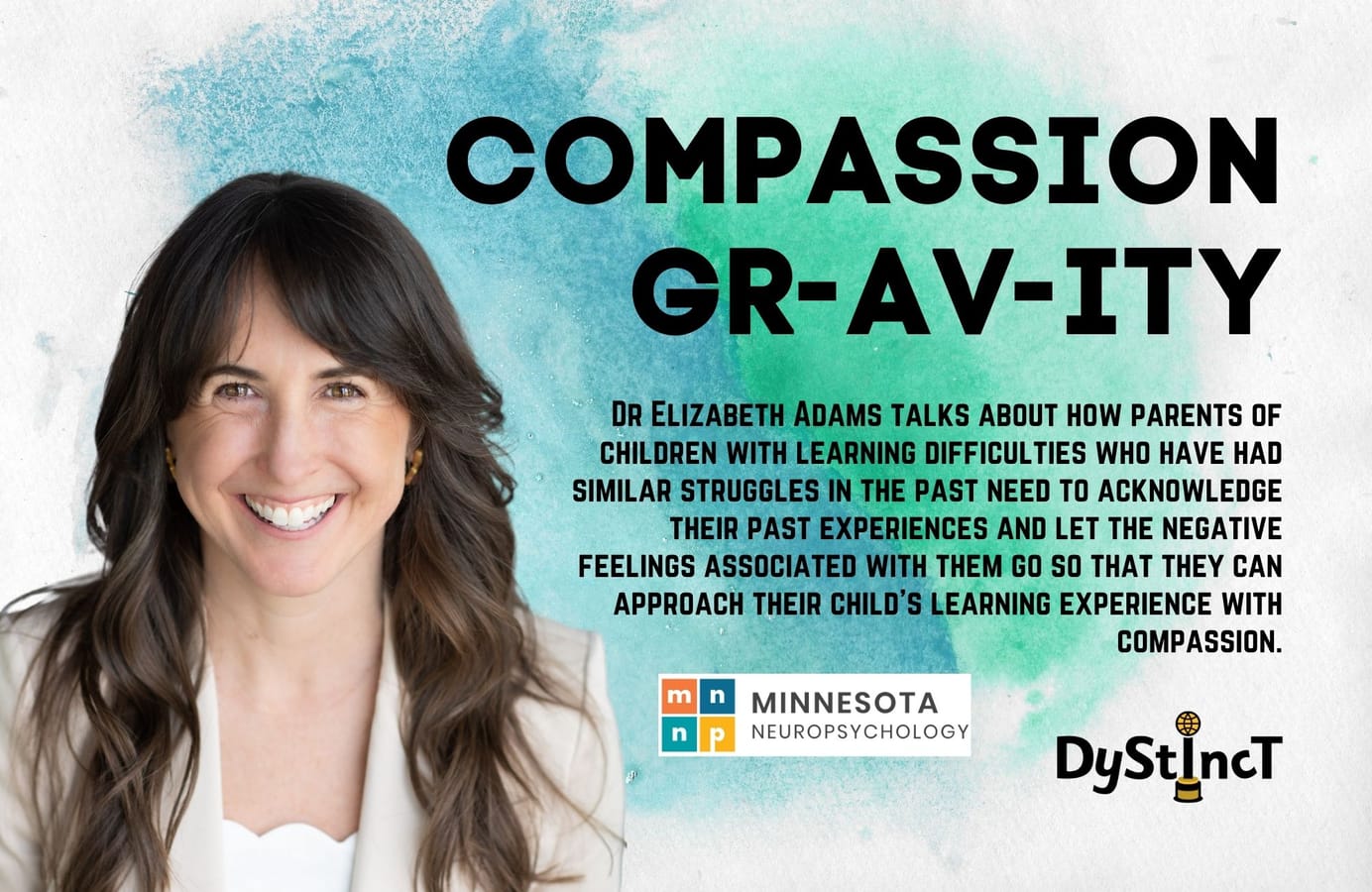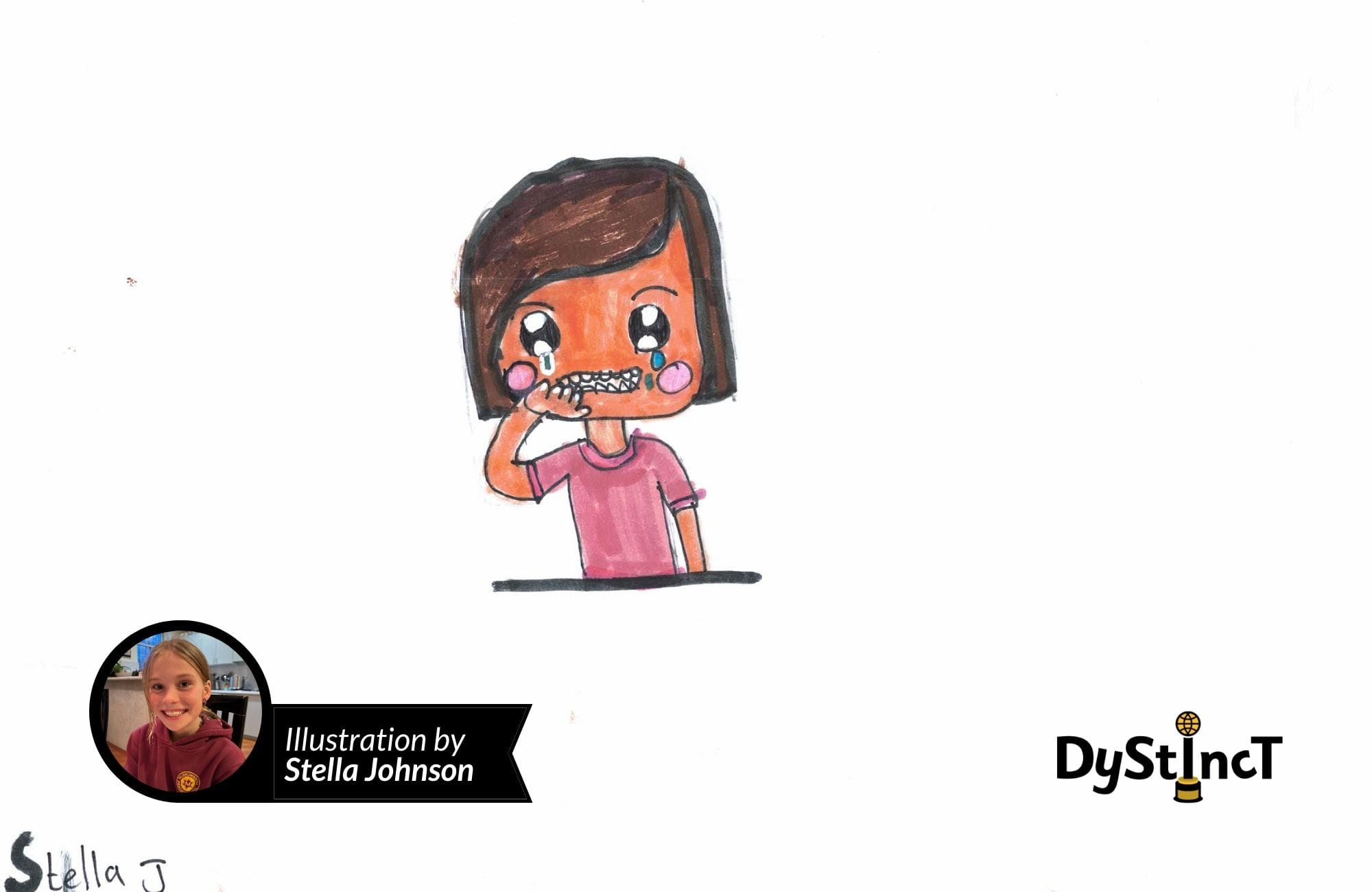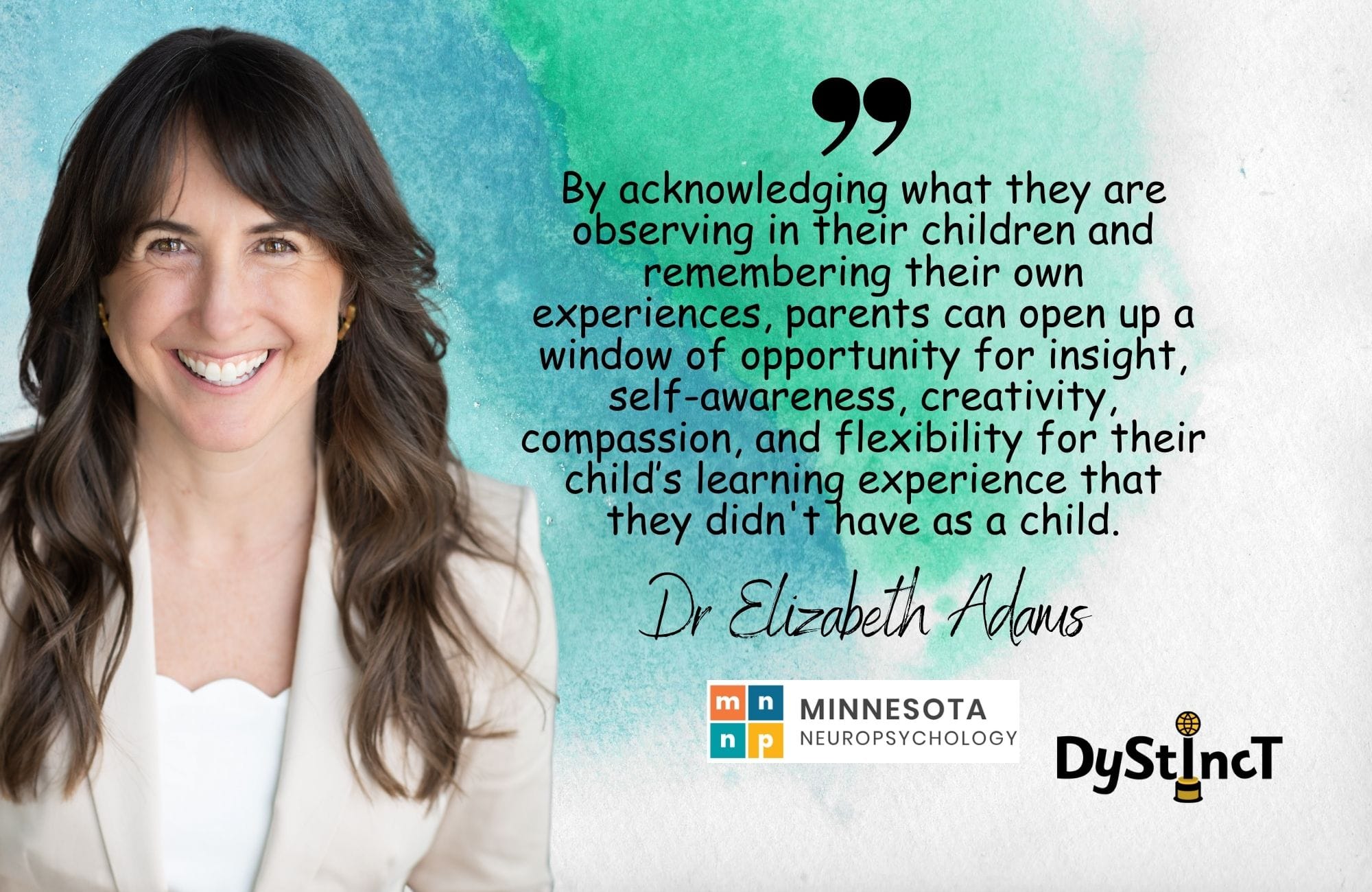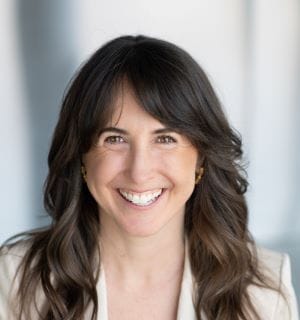
Issue 11: Compassion GR-AV-ITY | Dr Elizabeth Adams
Dr Elizabeth Adams talks about how parents of children with learning difficulties who have had similar struggles in the past need to acknowledge their past experiences and let the negative feelings associated with them go so that they can approach their child's learning experience with compassion.
Table of Contents
Many learning differences, such as dyslexia/dysgraphia/dyscalculia and ADHD, are highly heritable at a rate of at least 50%. This means that many parents who are watching their kids struggle have themselves struggled in the same way in the past. When they watch their kids struggle, in a way they did as children, parents often reexperience their own history and the feelings that came along with their own academic challenges. This is somewhat complicated by the fact that many parents of kids today grew up in the 1980s, or the 90s, when learning differences were usually not recognized and kids just kind of had to get by.
Many parents who are watching their kids struggle have themselves struggled in the same way in the past.
When a parent who struggled in the past watches their kid struggle in the same way, a dual, parallel emotional process occurs. The parent is experiencing maybe frustration or disappointment, or fear as they watch their kid struggle, in an empathic and compassionate way. Simultaneously, and usually unknowingly or subconsciously, the parent is experiencing maybe the same feelings toward themselves about their own difficulty managing the situation or about their own similar struggles.
Part of my work as a neuropsychologist involves helping parents separate those two things and consider them independently so that there's more clarity around the experience. It's separating the parent's own experience from the parent-child dyad and their shared experience. By acknowledging what they are observing in their children and remembering their own experiences, parents can open up a window of opportunity for insight, self-awareness, creativity, compassion, and flexibility for their child’s learning experience that they didn't have as a child.
HERE'S A NEW TERM I COINED TO DESCRIBE THE PROCESS OF USING SELFLOVE TO LET DROP THE THINGS THAT NO LONGER SERVE US: COMPASSION GRAVITY.
By acknowledging the shame/self-limiting beliefs, we carry when we experience learning differences early in life, we can start to see how it doesn't serve us. Then, you will just naturally begin to let them go. They'll drop away.
IT'S A FORM OF GRAVITY
The thing (shame/hiding/self-limiting belief/fear/anger) that served you in the past (it was the only thing you knew to do; it saved you from the risk of ridicule, rejection, embarrassment)... that thing you acknowledge is no longer serving you.
AND NOW YOU KNOW THERE'S A BETTER WAY.
WHEN YOU SEE THAT IT IS NOT SERVING YOU, YOU WILL BEGIN TO LET IT GO. IT WILL DROP.
THE WISE, KNOWING PART OF YOURSELF WILL DROP IT.
IT JUST NEEDS PERMISSION FROM THE YOUNG, FRAGILE, VULNERABLE CHILD PART OF YOU THAT DEVELOPED IT FOR PROTECTION LONG AGO.
THE CHILD PART OF YOU IS STILL A PART OF YOUR SYSTEM. IT'S IMPORTANT TO ACKNOWLEDGE IT AND RESPECT IT/THANK IT FOR DOING THE BEST IT KNEW HOW.
YOU, AS THE ADULT OBSERVER, CAN HELP THE CHILD PART TO LET IT GO.
YOU ARE SUPPORTED/ PROTECTED NOW. IT'S SAFE TO LET SOME THINGS LIKE THIS GO.
RECOGNIZE THAT THE THING THAT ONCE SERVED YOU TO PROTECT YOU IS NO LONGER SERVING YOU AND MIGHT BE HOLDING YOU BACK.
THERE'S MAGIC IN ACKNOWLEDGING THIS. JUST BY ARTICULATING THIS, THE PROCESS OF COMPASSION GRAVITY WILL BEGIN.
THE ENERGY YOU'VE DEDICATED TO HIDING AND SELF-PROTECTION WILL CONVERT INTO LOVE AND CREATIVITY, OPENING UP PATHS YOU NEVER KNEW WERE THERE.
Here's a bit more on the process, thinking of compassion as an antidote.
The Antidote
The Antidote
When we are kids, we do the best we know how to protect ourselves. It's human nature. We do that emotionally, too. When we do that emotionally, what we're doing is protecting ourselves from the things that we perceive to be scary. Most young humans do this by hiding. That's a pretty effective strategy. When we hide parts of ourselves from a perceived threat, that can develop into a pattern called shame. It happens when we believe that there is a part of ourselves or a part of our lived experiences as humans that's not safe to let other people know about. So, as kids, that happens.
When we hide parts of ourselves from a perceived threat, that can develop into a pattern called shame.
In the context of school and learning experiences, everyone has these narratives and self-limiting beliefs and things that we carry. "I'm not good enough," "If I only tried harder." When there is a learning difference like dyslexia or ADHD that makes us different from our peers, the hiding reaches another level. Because we don't want other people to know that we're having a hard time. So, as a kid, you do a thing - you develop a strategy to avoid the scary thing, which is other people knowing that you're struggling, and you hide it.
Fast forward into adulthood. The truth of it is that most adults carry those tendencies and beliefs (many of which are not actually congruent with reality) all the way through their whole lives, through the entire trajectory of life. But, the thing is, we don't need to. Because, as adults, we have this capacity to circle back to our younger selves with this antidote of compassion.
How about that? It's like the adult you is trotting back on a horse, with this bottle of antidote, to your 8-year-old self. And the antidote is compassion and loving awareness. Clip clop, on the horse, circling back.
The problem is that an 8-yearold developed a strategy that worked. And so, he/she is not going to be super quick to give it up. And so, as adults, we just have to keep circling back and circling back. The beauty is that the antidote never runs out. It's a potion like in fairy tales - It never runs out.
The antidote is compassion and loving awareness.
A REALLY HELPFUL FIRST STEP IN BREAKING FREE FROM THESE SELF-IMPOSED LIMITATIONS IS TO START TO WIGGLE THEM GENTLY.
Let's imagine all the way back to our 6-year-old selves and remember the experience of having a loose tooth. The tooth is in there, and it served a purpose for a while, but it's ready to come out. At this point, you sort of become aware of it. Then one day, you realize you can wiggle it a little bit with your tongue, and then you gently wiggle it more and more. You eventually figure out that the looser it gets, the more it wiggles, and then, blammo! One day, it falls straight out of your mouth. It doesn't hurt when it falls out, mainly because it was ready to come out but also because you did your due diligence to wiggle it.
WHEN IT COMES OUT, IT LEAVES ROOM FOR NEW GROWTH.

We can do the same thing with our thoughts. Bring a nonjudgmental awareness to some beliefs we hold about ourselves, then start to ask ourselves if they are sticking around because they're helping us or just because we haven't let go of them yet.
When parents start doing this process for themselves, finding that sensation, that feeling of compassion for their own younger self experiences, they will begin to open up a whole new perspective on their children's struggles. Creative ideas and optimism will replace frustration and perceived futility. Learned helplessness will fade away, and parents and children will thrive in their own perfect unique ways.
Dr Elizabeth Adams
Neuropsychologist and Founder
mnneuropsychology.com | Facebook | Instagram
Dr Elizabeth Adams

Dr Adams is a board-certified neuropsychologist with 14 years of professional experience. She is the owner of Minnesota Neuropsychology and specializes in providing assessments for dyslexia, dysgraphia, dyscalculia, ADHD, gifted/talented, nonverbal learning disorder, and other learning differences. She completed her doctoral degree in clinical psychology at the Fuller Theological Seminary's Graduate School of Psychology in Pasadena, California, including clinical training at UCLA's Neuropsychiatric Institute and a 1-year residency in adult neuropsychology at Rush University Medical Center in Chicago. In addition, she completed a 2-year post-doctoral fellowship in pediatric neuropsychology at the Medical College of Wisconsin.
Dr Adams is honored to be a part of these organizations: Decoding Dyslexia Minnesota, Minnesota Council for the Gifted and Talented, International Dyslexia Association - Upper Midwest Branch, and clinical practicum supervisor for the University of Minnesota's Doctoral Psychology program.
Extracts from Dystinct Magazine
Extracts from Dystinct Magazine












